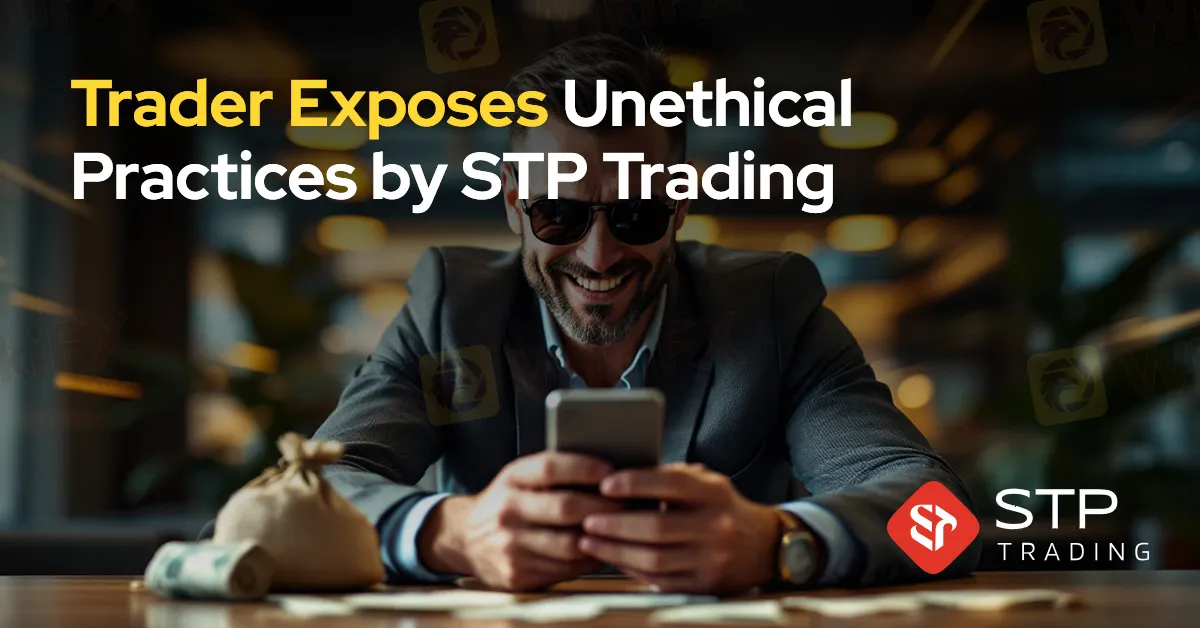简体中文
繁體中文
English
Pусский
日本語
ภาษาไทย
Tiếng Việt
Bahasa Indonesia
Español
हिन्दी
Filippiiniläinen
Français
Deutsch
Português
Türkçe
한국어
العربية
Trader Exposes Unethical Practices by STP Trading
Abstract:A recent allegation against STP Trading has cast doubt on the firm's business practices, highlighting the potential risks faced by retail traders in an increasingly crowded and competitive market.

In the high-stakes arena of online trading, trust and transparency form the foundation of any credible broker-client relationship. A recent allegation against STP Trading, a broker with a WikiScore of 5.70, has cast doubt on the firm's business practices, highlighting the potential risks faced by retail traders in an increasingly crowded and competitive market.
According to the complainant, Esmaeil, their ordeal began with a $1,005 deposit into an account with STP Trading. After opening a position on XAU/USD (gold) with a lot size of 0.6, the trader closed the trade with a profit of $454—a result they had every reason to celebrate. However, what transpired next proved to be anything but ordinary.


The trader alleges that STP Trading abruptly closed their account without prior notice or explanation. Despite multiple attempts to retrieve the full amount due—including their initial capital and the profit earned—they claim to have received only $949, falling significantly short of their expectations.
The brokers actions raise critical concerns about transparency and client protection. Abrupt account closures without clear justification and partial fund returns not only undermine the principles of fair trading but also erode confidence in the broker's operational integrity. For retail traders, whose financial stability often hinges on timely access to their capital and earnings, such incidents are particularly damaging.

STP Tradings WikiScore of 5.70, as rated by the regulatory query platform WikiFX, reflects a performance that falls below industry benchmarks. WikiFX recommends a minimum score of 7.0 for traders seeking reliable and transparent brokerage services. Scores below this threshold, while not necessarily indicative of outright fraud, often point to operational inconsistencies or a lack of regulatory oversight—factors that can leave traders vulnerable to disputes and financial losses.
The implications of such incidents extend far beyond individual cases. Unresolved grievances and questionable practices tarnish the reputation of the trading industry as a whole, discouraging participation and diminishing trust in online trading platforms. Brokers must recognise that their long-term viability depends on maintaining transparent operations and prioritising customer satisfaction.

For traders, this case underscores the importance of rigorous due diligence when selecting a broker. Regulatory credentials, client reviews, and independent ratings on platforms such as WikiFX should serve as essential checkpoints in the decision-making process. Choosing a broker solely based on promises of high returns or appealing marketing campaigns is a gamble that can lead to significant financial and emotional setbacks.
STP Trading has yet to address the allegations or provide clarification regarding the traders claims. Until such a response is forthcoming, the case remains a stark reminder of the potential pitfalls in online trading.

Disclaimer:
The views in this article only represent the author's personal views, and do not constitute investment advice on this platform. This platform does not guarantee the accuracy, completeness and timeliness of the information in the article, and will not be liable for any loss caused by the use of or reliance on the information in the article.
Read more

Never Heard of Dynasty Trade? Here's Why You Should Be Worried
Have you heard this name before? No , it’s time you do because staying unaware could cost you. This platform is currently active in the forex trading and has been linked to several suspicious activities. Even if you’ve never dealt with it directly, there’s a chance it could reach out to you through ads, calls, messages, or social media. That’s why it’s important to know the red flags in advance.

Want to Deposit in the EVM Prime Platform? Stop Before You Lose It ALL
Contemplating forex investments in the EVM Prime platform? Think again! We empathize with those who have been bearing losses after losses with EVM Prime. We don't want you to be its next victim. Read this story that has investor complaints about EVM Prime.

WEEKLY SCAM BROKERS LIST IS OUT! Check it now
If you missed this week's fraud brokers list and are finding it difficult to track them one by one — don’t worry! We’ve brought together all the scam brokers you need to avoid, all in one place. Check this list now to stay alert and protect yourself from fraudulent brokers.

Catch the Latest Update on BotBro & Lavish Chaudhary
BotBro, an AI-based trading platform, became popular in India in 2024—but for negative reasons. Its founder, Lavish Chaudhary, who gained a huge following by promoting it heavily on social media. Since then, he has become well-known, but for many controversies. Let’s know the latest update about Botbro & Lavish Chaudhary.
WikiFX Broker
Latest News
Asia-Pacific stocks fall as investors weigh recent trade developments
Is Your Forex Strategy Failing? Here’s When to Change
FSMA Warns That Some Firms Operate as Pyramid Schemes
Apex Trader Funding is an Unregulated Firm | You Must Know the Risks
LVMH shares jump 2.5% after reporting better-than-feared earnings, Texas factory plans
Why Octa Is the Ideal Broker for MetaTrader 4 & 5 Users
Stop Level Forex: How Does it Help Traders Prevail When Losses Mount?
5 things to know before the Thursday open: Meme stock revival, Trump's Fed visit, Uber's gender feature
CNBC's Inside India newsletter: Leaving, but not letting go — India's wealthy move abroad, but stay invested
Moncler raises prices on tariffs, may postpone store openings if downturn worsens
Currency Calculator


